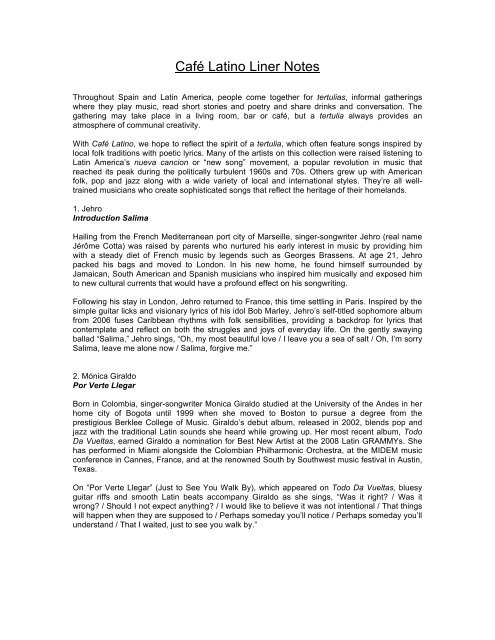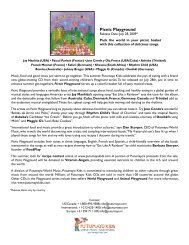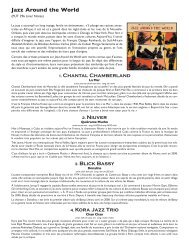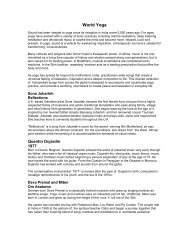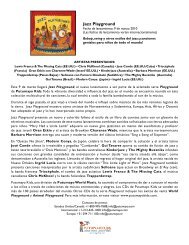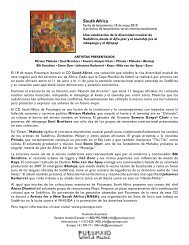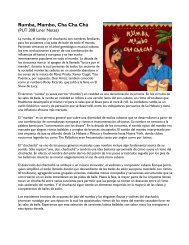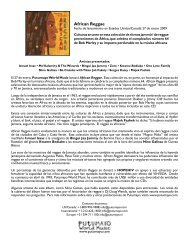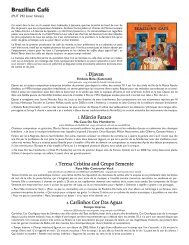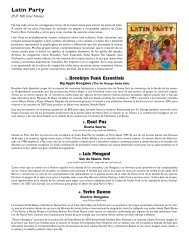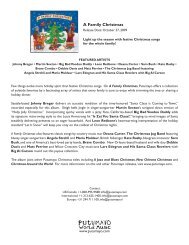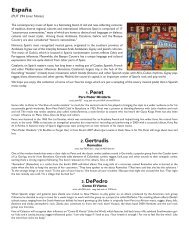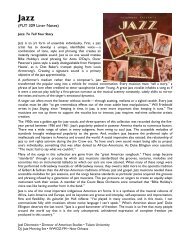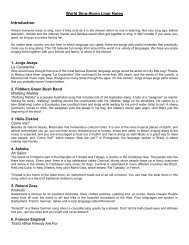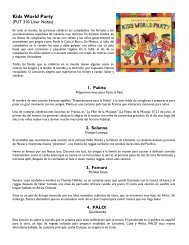Create successful ePaper yourself
Turn your PDF publications into a flip-book with our unique Google optimized e-Paper software.
Café Latino Liner Notes<br />
Throughout Spain and Latin America, people come together for tertulias, informal gatherings<br />
where they play music, read short stories and poetry and share drinks and conversation. The<br />
gathering may take place in a living room, bar or café, but a tertulia always provides an<br />
atmosphere of communal creativity.<br />
With Café Latino, we hope to reflect the spirit of a tertulia, which often feature songs inspired by<br />
local folk traditions with poetic lyrics. Many of the artists on this collection were raised listening to<br />
Latin America’s nueva cancion or “new song” movement, a popular revolution in music that<br />
reached its peak during the politically turbulent 1960s and 70s. Others grew up with American<br />
folk, pop and jazz along with a wide variety of local and international styles. They’re all welltrained<br />
musicians who create sophisticated songs that reflect the heritage of their homelands.<br />
1. Jehro<br />
Introduction Salima<br />
Hailing from the French Mediterranean port city of Marseille, singer-songwriter Jehro (real name<br />
Jérôme Cotta) was raised by parents who nurtured his early interest in music by providing him<br />
with a steady diet of French music by legends such as Georges Brassens. At age 21, Jehro<br />
packed his bags and moved to London. In his new home, he found himself surrounded by<br />
Jamaican, South American and Spanish musicians who inspired him musically and exposed him<br />
to new cultural currents that would have a profound effect on his songwriting.<br />
Following his stay in London, Jehro returned to France, this time settling in Paris. Inspired by the<br />
simple guitar licks and visionary lyrics of his idol Bob Marley, Jehro’s self-titled sophomore album<br />
from 2006 fuses Caribbean rhythms with folk sensibilities, providing a backdrop for lyrics that<br />
contemplate and reflect on both the struggles and joys of everyday life. On the gently swaying<br />
ballad “Salima,” Jehro sings, “Oh, my most beautiful love / I leave you a sea of salt / Oh, I’m sorry<br />
Salima, leave me alone now / Salima, forgive me.”<br />
2. Mónica Giraldo<br />
Por Verte Llegar<br />
Born in Colombia, singer-songwriter Monica Giraldo studied at the University of the Andes in her<br />
home city of Bogota until 1999 when she moved to Boston to pursue a degree from the<br />
prestigious Berklee College of Music. Giraldo’s debut album, released in 2002, blends pop and<br />
jazz with the traditional Latin sounds she heard while growing up. Her most recent album, Todo<br />
Da Vueltas, earned Giraldo a nomination for Best New Artist at the 2008 Latin GRAMMYs. She<br />
has performed in Miami alongside the Colombian Philharmonic Orchestra, at the MIDEM music<br />
conference in Cannes, France, and at the renowned South by Southwest music festival in Austin,<br />
Texas.<br />
On “Por Verte Llegar” (Just to See You Walk By), which appeared on Todo Da Vueltas, bluesy<br />
guitar riffs and smooth Latin beats accompany Giraldo as she sings, “Was it right? / Was it<br />
wrong? / Should I not expect anything? / I would like to believe it was not intentional / That things<br />
will happen when they are supposed to / Perhaps someday you’ll notice / Perhaps someday you’ll<br />
understand / That I waited, just to see you walk by.”
3. Roberto Poveda<br />
Mulatto<br />
Roberto Poveda spent many nights as a child in Cuba listening to his grandfather, a trovador, or<br />
folk singer, singing tales of love and legend. As a young man, Poveda joined Havana’s<br />
burgeoning nueva trova movement of singer-songwriters who sought to bring a more creative and<br />
literary approach to Cuba’s folk traditions. In 1989, he moved to Colombia where he made a living<br />
as a soap opera star while continuing to hone his musical skills on the side. His songwriting<br />
talents earned him a deal with a music publisher and he has written many hit songs for Latin pop<br />
stars. Poveda now lives in New York City.<br />
“Mulatto” is from Poveda’s 2012 album, Brooklyn Nights. “The dream that gives you a life /<br />
Sometimes it gives sometimes it takes / Perhaps, it never comes back / And it’s not worth waiting<br />
for / Because waiting makes you tired / Sat in a station of a train that has no schedule / Nor date<br />
nor calendar in your heart / Consider me , consider her, consider.”<br />
4. Amanda Martinez<br />
Alcoba Azul<br />
Born in Canada to a Mexican father and South African mother, Amanda Martinez grew up amidst<br />
a wide range of musical influences. After obtaining degrees in biology and international business,<br />
Martinez decided to focus on her true passion and pursue a career in music. She released two<br />
acclaimed albums and is about to release her third, which was produced by renowned Spanish<br />
producer Javier Límon. Following performances at the 2011 Pan American Festivities in Mexico,<br />
the 2010 FIFA World Cup Festivities in South Africa, the Montreal Jazz Festival and New York’s<br />
iconic Blue Note club, Martinez’s growing international audience is steadily catching up to her<br />
widespread popularity in Canada.<br />
“Alcoba Azul” (Blue <strong>Room</strong>) originally appeared on Martinez’s 2009 album, Amor. Backed by a<br />
passionate tango rhythm and the lilting strains of violinist Osvaldo Rodriguez, Martinez sings<br />
“Come back to me / Love me in the dark / In our blue room / Where there was no sun for us.”<br />
5. Jose Conde<br />
El Avion<br />
Although Jose Conde’s parents left Cuba for the U.S. before he was born, the rhythms and spirit<br />
of the island made up a significant part of his upbringing. Growing up in the cultural melting pot of<br />
Miami in the 1970s, Conde was not only exposed to the music of the Cuban expatriate community,<br />
but also to Haitian compas, as well as contemporary American styles like funk, soul and<br />
R&B. As a student at the Berklee School of Music in Boston, Conde experimented with rock, jazz<br />
and even opera before he began to feel the need to return to his Latin roots. Conde, who usually<br />
records and performs with his band, Ola Fresca (Fresh Wave), has released three critically<br />
acclaimed albums that explore the relationships between his many influences, but always with an<br />
underpinning of Cuban grooves.<br />
“El Avion” (The Airplane) is from Conde’s 2011 album entitled simply Jose Conde. It features a<br />
more laid-back, reggae-tinged flavor that is reminiscent of Manu Chao. “When will the spaceship<br />
land / When will the airplane return / To make me happy again / This pain in my heart / I feel like<br />
I’m on a cloud / Softly floating.”
6. Sacha Nairobi<br />
Congelados en el Tiempo<br />
In 1998, Sacha Hidalgo, a.k.a. Sacha Nairobi, moved from Venezuela to the U.S. Nairobi hails<br />
from a musical family; her father is a singer-songwriter and he leads a family band called Los<br />
Hidalgos that also includes her three brothers. Sacha Nairobi’s irresistibly catchy Latin pop<br />
receives a special twist from the prominent role of the cuatro, a small guitar common in Latin<br />
American traditional music. Nairobi plays the cuatro herself throughout her self-titled debut album,<br />
which was released in the end of 2005. Her follow up album is due for release in the fall of 2013.<br />
Written by Nairobi’s frequent collaborator, Colombian producer Germán Ortiz, “Congelados en el<br />
Tiempo” (Frozen in Time), will appear on both Nairobi’s and Ortiz’s upcoming albums. “I like your<br />
early morning silence / And your hair sailing on my pillow / I like your transparent, honest gaze /<br />
And the aroma of your body dispersed into the air / If I were to die today / I’d like to take this<br />
moment with me until the end / You and me / Forever frozen in time.”<br />
7. Miquel Gil<br />
L’amor es Déu en Barca<br />
Miquel Gil hails from Valencia, Spain’s third largest city after Madrid and Barcelona. After a long<br />
career as a member of the folk-revival groups Al Tall and Terminal Sur, Gil went solo, blending<br />
elements of local styles such as flamenco and rumba with North African percussion and South<br />
American cumbia to create a unique style that captures the multicultural legacy of the region. His<br />
scruffy voice croons over pop grooves that combine folk influences with the musical traditions of<br />
the Mediterranean.<br />
From Gil’s 2001 album Orgànic, “L’amor es Déu en Barca” (Love is God in a Boat) features a<br />
loping beat and gentle accordion and acoustic guitar accents. Gil sings in Catalan, the<br />
predominant language of Spain’s Northeast, “Love is the ritual of life / Love is bread with cheese /<br />
Love is God in a boat / Life is a shipwreck / A glass of white wine / Love is falling in a pool / And<br />
finding love.”<br />
8. Alex Cuba Band<br />
Café Havana<br />
Born Alexis Puentes in Artemisa, a city west of Havana, Alex Cuba learned music from his father,<br />
a guitarist with a Master’s degree in music. After marrying a Canadian woman and moving to<br />
Victoria, British Columbia, Alex and his twin brother Adonis formed The Puentes Brothers and<br />
released the album Murumba Cubana in 2000. In 2003, he moved to a small city far north of<br />
Vancouver, where he has had a very successful solo career. With four solo albums under his belt,<br />
two Junos (the Canadian equivalent of a GRAMMY), a Latin GRAMMY for “Best New Artist” and<br />
a GRAMMY nomination for “Best Latin Pop Album,” Alex Cuba has become an independent Latin<br />
music star. He has also recorded a number of songs with pop singer Nelly Furtado, including their<br />
2009 hit collaboration “Manos Al Aire” (Hands in the Air).<br />
“Café Havana” appeared on Alex Cuba’s first solo album Humo de Tabaco from 2006. “Before we<br />
begin the game / Of looking at each other and not saying a thing / I’m going to escape the fire /<br />
That you ignite with your eyes / Today I will take you to a new world / To tell you that I love you.”
9. Alex Alvear with Marta Gómez<br />
Soñando con Quito<br />
Originally from Quito, Ecuador, bassist, singer, composer and arranger Alex Alvear co-founded<br />
the “urban folklore” ensemble, Promesas Temporales, and Afro- Cuban salsa band, Rumbasón,<br />
before moving to the U.S. in 1986. Having concluded his studies at Berklee College of Music,<br />
Alvear is now based in Boston and leads the band Mango Blue, oversees the Equatorial music<br />
project, and teaches and performs with a number of different Latin ensembles. In 2007, Alvear<br />
released the album Equatorial, which explores the music of the Andean region from new and<br />
innovative perspectives.<br />
On “Soñando con Quito” (Dreaming with Quito), Alvear is joined by another South American<br />
expatriate, Colombia’s Marta Gómez, whose beautiful voice has been featured on numerous<br />
<strong>Putumayo</strong> collections. Ecuadorian singer and songwriter Margarita Laso wrote the lyrics, which<br />
offer a reflection on the nostalgia for a far away homeland.<br />
10. Georgina Hassan<br />
A Primera Vista<br />
Georgina Hassan was born in Buenos Aires, Argentina in 1977 and grew up listening to music of<br />
Atahualpa Yapanqui, Mercedes Sosa and other leading figures of Latin America’s new song<br />
movement. During Hassan’s musical studies she focused on folkloric guitar styles and recorded<br />
her first album, Primera Luna, in 2004, followed in 2009 by Como Respirar. She has shared the<br />
stage with many South American stars, and received an invitation from Basque musician Kepa<br />
Junkera to sing on his 2009 album Kalea, which also featured Cuban icon Pablo Milanés,<br />
Mexican star Lila Downs and Brazilian legend Ivan Lins.<br />
Hassan recorded “A Primera Vista” (At First Sight) for her second studio album. The song is<br />
Hassan’s interpretation of a composition by Brazilian star Chico César. Hassan sings in<br />
Portuguese as well as Spanish: “When I didn’t have anything, I desired / When everything was<br />
empty, I hoped / When I was cold, I shivered / When I had courage, I called / When the letter<br />
came, I opened it / When I listened to Prince, I danced / When your eye sparkled, I understood /<br />
When I grew wings, I flew.”


